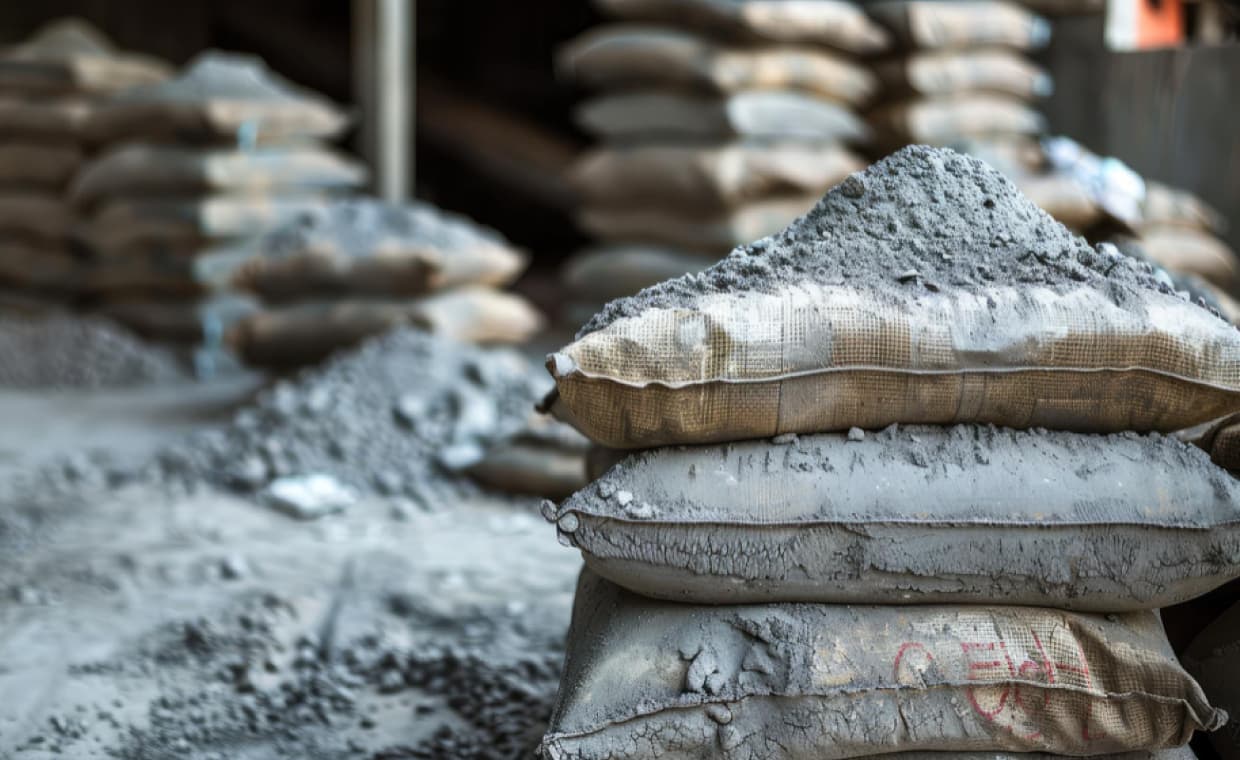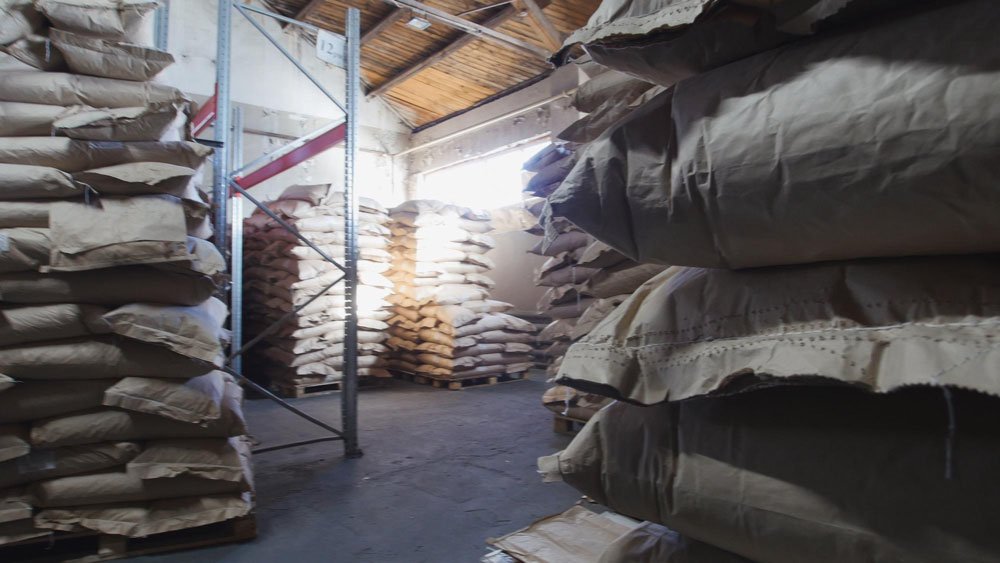
Table of Contents
Quick Review
- Concrete is the most widely used construction material, made from a mixture of cement, sand, and aggregates.
- Cement is a binding material that reacts with water and hardens over time.
- Fresh cement has many benefits; however, due to its large-scale use in construction projects, it is usually purchased in bulk and stored.
- This raises a concern: will stored cement lose its strength over time, and what is its actual shelf life?
- Unused cement gradually deteriorates, especially when exposed to moisture.
- Using old or deteriorated cement reduces the strength of concrete.
- Hence, it is important to use cement within three months of manufacturing and store it properly, avoiding any contact with moisture.
- Always test the quality of cement before use. Common tests include the hand test, float test, lump test, and strength cube test.
The construction industry is growing at a pace like never before. Numerous projects are in progress around the world and the core of each project lies a crucial factor, the construction materials. While the materials and construction techniques have evolved over time, one element still governs the construction sector. No prizes for guessing that it is concrete.
Concrete is the most widely used construction material, made from a mixture of cement, sand and aggregates. Today, we will discuss on shelf life of cement and find out whether it loses strength over time if left unused.
Cement is a powdered chemical compound that reacts with water and hardens over time. It is a binding material which, by itself, does not have significant strength but has great binding properties. Cement, when mixed with sand and aggregates, forms concrete, a material known for its exceptional compressive strength. There is hardly any construction project that doesn’t use cement and because of this wide usage, cement is usually stored in bulk. However, few are aware of the shelf life of cement, which is commonly referred to as the cement’s expiry date or expiry period, especially when it is stored for long durations.
Also Read: How Concrete is Made?
Fresh cement has many benefits. It leads to good quality of construction, which ultimately results in a longer service life of the building. However, cement that is stored in a godown beyond its expiry date, or left exposed to the environment for a longer duration, may compromise the quality of construction. Even when the cement is well-protected in the cement godown, it still absorbs moisture from the atmosphere and over time, it begins to lose its strength. This gives way to the million-dollar question about the strength of the cement.
Does Old Cement Lose Strength?
Yes, cement loses its strength over a period of time.
Cement is available in the form of a very fine powder and it tends to absorb moisture from the atmosphere. When it absorbs moisture, it hydrates, hardens and forms lumps. The hardened cement loses its reactivity, leading to a reduction in both its binding property and strength. Such a cement becomes unfit for use as it has already undergone a partial hydration process.
Also Read: What is the Effect of Moisture on Cement Bags?
The following table shows the loss of strength at different time intervals:
| Age of Cement | % Reduction in Strength of Cement |
| 3 Months | 20-30 |
| 6 Months | 30-40 |
| 12 Months | 40-50 |
We know that cement gradually deteriorates with time, especially when exposed to moisture. Usually, manufacturers recommend using cement within about three months of the manufacturing date for best results. However, one must understand that its strength can decline even earlier if not stored properly. Most cement bags display the manufacturing and expiry date. Check this date carefully before use.
Concrete is the most versatile material in the construction industry. It is no secret that fresh and good-quality cement makes durable concrete. Using old or deteriorated cement reduces the strength of concrete/mortar, which will show in the overall quality of construction.
Must Read: How to Check the Quality of Cement at Site?
Cement Dos and Don’ts
Dos

- Use cement within 3 months of manufacturing.
- Store cement bags on pallets, and avoid direct contact with the floor.
- Keep bags away from moisture and damp walls.
Don’ts
- Store cement near bathrooms or kitchens.
- Leave bags exposed in the open air.
- Use hardened or lumpy cement.
How to Test Cement Quality?
If you are a common man and you want to know the quality of the cement that you are purchasing, then here are a few tests.
- Hand test: The cement must feel smooth and not gritty when you rub it between your fingers.
- Float test: Sprinkle a small amount in water. Fresh cement should float for some time before sinking.
- Lump test: Break lumps with fingers. If it feels hard, it is unfit for use.
- Strength cube test: This is technical. It involves making cement cubes, curing them and then crushing them in a compression testing machine to measure the cement’s compressive strength.
Myths Busted
Myth: Cement never expires if stored inside.
Fact: Even in a sealed warehouse, it absorbs moisture gradually and weakens.
Myth: You can just crush lumps and reuse cement.
Fact: Lumps mean hydration has already begun! This means the cement is losing strength.
Myth: All types of cement last equally long.
Fact: OPC loses strength faster than PPC because of different compositions.
Myth: Mixing old cement with fresh cement will make the old cement fit for use.
Fact: Mixing expired cement with fresh cement won’t restore strength. In fact, it compromises the entire mix.
Note that the strength of any concrete structure majorly depends on the strength of the cement, which in turn depends on the time lapse since bagging. Using old cement can save you a few rupees, but it can cost you dear in the long run, leaving your structure with problems like cracks, leakages, corrosion, etc. and decreasing the life of your structure. Remember the mantra, fresh cement=strong, durable and safe construction.
Also Read: 10 Ways of Handling Cement Bags Manually
FAQs on Cement Shelf Life in Construction
01. Does cement weaken over time?
Yes, with time, cement starts losing its compressive strength. A cement that is one year old loses 40% to 50% of its strength.
02. Does cement get harder over time?
Cement powder tends to absorb moisture from the surroundings. Prolonged exposure to moisture initiates a chemical reaction (hydration), hardening the cement gradually.
03. Can I use 2-year-old cement?
No, the 2-year-old cement has expired and it is unfit for use. Using this cement will only compromise the quality of construction.
04. How long does cement last?
Cement generally lasts for about 3 months if stored properly. After this period, it gradually begins to lose its strength.
05. How should cement be stored to prevent strength loss?
– Store cement bags in a dry warehouse.
– Keep cement bags off the ground, preferably on wooden pallets.
– Rotate the stock (first in, first out).
– Keep it away from damp walls and leaky roofs.
06. Can moisture-damaged cement be restored?
No, once the cement powder comes in contact with moisture, the hydration process starts and it is irreversible. Once cement forms lumps, it cannot be used as a binding agent.






























